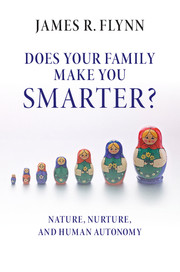Book contents
- Frontmatter
- Dedication
- Epigraph
- Contents
- List of figures, tables and boxes
- Acknowledgments
- Part I Human autonomy
- Part II Intelligence
- 7 The Raven's revolution
- 8 Learning from astronomy
- 9 The meta-theory of intelligence
- 10 Scientific theories of intelligence
- 11 Psychology and Cardinal Bellarmine
- For scholars who wish to use the Age-Table Method to measure family effects in nations other than the USA
- Appendix I Wechsler Vocabulary and description of method of analysis
- Appendix II Stanford-Binet Vocabulary
- Appendix III Raven's Progressive Matrices
- References
- Name index
- Subject index
10 - Scientific theories of intelligence
from Part II - Intelligence
Published online by Cambridge University Press: 05 June 2016
- Frontmatter
- Dedication
- Epigraph
- Contents
- List of figures, tables and boxes
- Acknowledgments
- Part I Human autonomy
- Part II Intelligence
- 7 The Raven's revolution
- 8 Learning from astronomy
- 9 The meta-theory of intelligence
- 10 Scientific theories of intelligence
- 11 Psychology and Cardinal Bellarmine
- For scholars who wish to use the Age-Table Method to measure family effects in nations other than the USA
- Appendix I Wechsler Vocabulary and description of method of analysis
- Appendix II Stanford-Binet Vocabulary
- Appendix III Raven's Progressive Matrices
- References
- Name index
- Subject index
Summary
Questions
(1) Do current theories of intelligence “fit within” with my own meta-theory?
(2) How compatible are these theories with one another?
We abandon meta-theory to discuss theories in the narrow sense of scientific theories. These undertake the strictly scientific task of explaining phenomena under three headings: clarifying the nature of individual differences, or group differences (including differences between the generations), or brain physiology. I do not believe that any of them challenge either my overall heuristic for intelligence or the quasi-heuristics that give advice to scientific researchers in the three areas. They do not all fit neatly within one of the three areas. Indeed, it would be a poor theory that did not have implications for one of its neighbors. But usually, they originated in one area and I will classify them by their area of origin. The exceptions are theories that were actually designed to bridge areas – that is, were attempts to reconcile findings within two areas that seemed incompatible with one another.
Individual differences
I. g-centered theories
Jensen
I have discussed Jensen's theory at length as a counterpoint to developing my own and will be brief. Its salient feature is its focus on g, the general factor that emerges from the fact that cognitive abilities are inter-correlated (people who do better on one tend to better on all). Jensen was quite aware that factor analysis produced other cognitive abilities that were also significant: verbal factors, memory factors, and so forth. For example, he argues that black and white Americans are relatively equal for rote memory while unequal for more complex thinking.
But even so, aside from race, he did little to analyze the operational cognitive abilities tested by the various Wechsler subtests – Vocabulary, Arithmetic, Comprehension, and Information, the abilities that have so much to do with the significance of individual differences. For example, less vocabulary means less reading, less adequate performance on the SAT, and so forth. I do not mean he would deny the latter. But once he had determined the flow of g (the irreplaceable fuel) through the subtests, he seemed to lose interest in them in their own right.
- Type
- Chapter
- Information
- Does your Family Make You Smarter?Nature, Nurture, and Human Autonomy, pp. 129 - 158Publisher: Cambridge University PressPrint publication year: 2016



